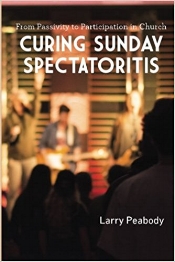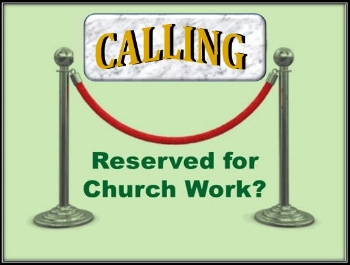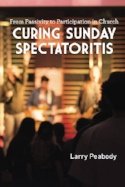A Fresh Look at the Sermon
Several authors have urged a return to what I call “shared church.” But their books don’t appear on best-seller lists, and few Christ-followers know about them. This blog is the third on such books.
Preaching as Dialogue: Is the Sermon a Sacred Cow?
When Jeremy Thomson, in his subtitle, asks, “Is the sermon a sacred cow?” he is not being flippant. Instead, he raises this serious question: Have we elevated the sermon—like Hindus have the cow—to the point of its being venerated and above question? In his little booklet (just 28 pages), Thomson strongly supports preaching. He says, “because I believe passionately in it . . . I want to see it done yet more faithfully.”
In Chapter 1, he points out that “preaching has become stereotyped into sermons.” The danger: when the 1st-century Bible says “preaching,” our 20th century minds read “sermon.” Yet preaching and teaching in the New Testament rarely, if ever, took place in the same “social setting” as the contemporary sermon.
No Pulpits for Jesus and Paul
Yes, Jesus gave “a few extended discourses . . . to a ‘passive audience’ (for example in Mk. 4:1ff; 6:34; 13:3ff).” But most of his preaching/teaching took place in other settings: the doorway of a house; during meals; on a shoreline or from a boat; walking through fields or along a road; on the Mt. of Olives; and so on. “Much of Jesus’ teaching,” Thomson says, “was given ‘on the way’ and involved a high degree of interaction with the audience (Mk. 8:27-10:52).”
Back-and-forth discussions, questions, responses—most of Jesus’ teaching involved dialogue. The woman at the well. Nicodemus. Crowds and critics. The man blind from birth. And, “The so-called upper-room discourse includes extensive interaction with the disciples (Jn. 14:1-16:23).”
Like Jesus, Paul preached interactively. Thomson cites an article by Stanley Sowers who “examines the circumstances of Paul’s preaching activity and shows that the most significant settings for it were the private house and the leather workshop. He concludes that ‘the widespread picture of Paul the public orator, sophist, or street corner preacher is a false one.’”
How Monological Sermons Became Central
In Chapter 4, Thomson traces how, as time passed, preaching and sermons came to be seen as nearly identical. Martin Luther’s recovery of “justification by grace through faith meant that this Pauline doctrine had to be declared. Thus the sermon became the very centre of the service of worship. . . . For John Calvin also the preacher was the ‘mouth of God’. . . . Calvin believed that congregations . . . should be passive receptors of sermons . . . implying congregational acquiescence so that any format other than the monologue sermon is unthinkable.”
More recently, “Martin Lloyd-Jones refused any idea of dialogue in the proclamation of the gospel.” In his book, Preaching and Preachers, Lloyd-Jones wrote: “We cannot in any circumstances allow [God] to become a subject for discussion or of debate or of investigation. I base my argument at this point on the word addressed by God Himself to Moses at the burning bush (Ex. 3:1-6). Moses . . . was proposing to turn aside and to examine this astonishing phenomenon. But immediately he is rebuked by the voice . . . . That seems to me to be the governing principle in this whole matter.”
However, as Thomson points out, taking Lloyd-Jones’ own example of the burning bush, right after this incident Moses engages God in a back-and-forth conversation, with questions and even negotiations. Thomson observes, “God takes human personality utterly seriously, graciously allows questions and supplies answers in a dialogical relationship. This . . . impels us to reject a monological theology of the sermon.”
The Case for Dialogue
Thomson offers his alternative in Chapter 5: “A Theology of Preaching as Dialogue.” He insists that real personhood involves give-and-take with others. In our vertical connection with God, he says, we “are called and invited into a dialogical relationship with God rather than subjected to megaphone-style address and manipulating power.” In our horizontal connection with other people, each of us is made in the likeness of the one-yet-three-personed God who within himself is relational. Monologue, then, is “distorted communication.” Dialogue is “genuine communication.”
God’s word to the gathered church comes not simply through one individual but “within the process of dialogue.” Thomson points to I Cor. 14:29, in which a prophet says something and someone else judges or evaluates what was said. In other words, God speaks not just through a single person but through the Body of Christ, as “each part does its work” (Eph. 4:16). This communication “process may require interaction for the purposes of clarification, interpretation, and application.”
Christian growth, says Thomson, actually depends on such interaction. “There must be a dialogue between teachers and learners if there is to be maturity in the church community; how can characters develop without the opportunity to verbalize? How can a community be a community if one person does all the talking? . . . The greatest preacher of them all asked questions, brought people into the conversation, took the observations and questions of others as opportunities to tackle the burning issues of life. Why have preachers forsaken him in this?”
We Christians, have, Thomson asserts, been “unduly influenced by a hierarchical view of reality.” Why? Because we have focused more on God as one than on God as social Trinity (see previous blog on Trinity in Human Community). Yes, there is a place for leadership in the church. But according to Jesus, leadership is not based on hierarchy but on what Thomson calls “lowerarchy.”
Changes Needed
In Chapter 6 Thomson lists several “practical implications.” In summary:
Turn away from the idea that traditional sermons “fulfil the responsibility to preach and teach. . . . A conventional sermon may be the most effective means of preaching from time to time; I do not mean that we must abandon the [monologue] sermon altogether.”
Do less evangelizing in normal church gatherings and more disciple-making through teaching. “Preaching should largely aim at teaching believers.”
Rely less on the monologue and learn how to make sermons participatory. “For Christians, the scriptural models of communication and education should count most.”
Let those teach who can draw out and involve others in the truth being presented. “It is as people have the opportunity to put their own words together that they become conscious of their thoughts and realize new paths of behavior.”
Give time both to prepared messages and those that respond on the spot to expressed needs. “On-going programs may sometimes have to be set aside in order to deal with unexpected and pressing questions.”
A New Wineskin for Sermons
After offering several practical suggestions for how to transition to dialogue sermons, Thomson concludes with this: “The resources available in the church are squandered if members believe that preaching is largely the responsibility of a special few who give sermons in religious settings. In order to communicate God’s word effectively preachers must recognize the limitations of the monologue format of the sermon and encourage more interaction with their congregations. The new wine of preaching will burst the old skin of the sermon.”













































